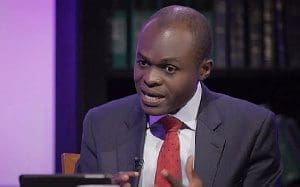
The government faces potential political consequences if it fails to address growing public dissatisfaction over discontinued corruption prosecutions, prominent legal analyst Martin Kpebu has warned. Speaking on TV3’s KeyPoints programme, he cautioned that citizens across party lines feel disappointed by controversial decisions to withdraw high profile cases, arguing that perceptions of selective justice could influence future electoral outcomes.
Kpebu emphasized that public anger remains palpable despite official explanations for the case discontinuations. “This thing can become a big election issue,” he stated. “The populace is not happy about withdrawals. Don’t underestimate Ghanaians, there is still anger around it.”
The legal practitioner specifically called for renewed investigation into the Saglemi Housing Project, where approximately $200 million was reportedly spent with limited results. He insisted the matter cannot simply fade away without proper accountability and transparency measures involving civil society organizations.
Attorney General Dr. Dominic Ayine has discontinued several high profile cases initiated under the previous administration, including charges against former Works and Housing Minister Collins Dauda and four others linked to the Saglemi project. The accused had initially faced 70 charges, including causing financial loss to the state, before all charges were dropped.
The Attorney General also discontinued the ambulance procurement case against Finance Minister Dr. Cassiel Ato Forson and businessman Richard Jakpa. These decisions have drawn criticism from various quarters, with some observers citing concerns about political bias and selective prosecution.
Kpebu previously urged the Attorney General to provide detailed explanations for each discontinued case, arguing that blanket announcements without assigned reasons raise public concerns. He suggested that if reasons were provided for each case, citizens could evaluate whether discontinuation had merit.
The legal analyst noted that wealth accumulation by some political officeholders fuels public frustration and perceptions of impunity. Without urgent corrective action, he warned the situation could “boomerang into our faces,” suggesting the government’s reputation for fighting corruption could suffer lasting damage.
Kpebu proposed establishing a collaborative review panel involving civil society groups like CDD Ghana and technical experts to conduct forensic audits of controversial projects. “This isn’t about partisan politics,” he stressed in earlier commentary. “It’s about ensuring every cedi is accounted for.”
The Saglemi Housing Project, launched in 2012 to deliver 5,000 affordable units, has long been mired in allegations of inflated contracts and substandard construction. A 2021 probe revealed only 1,502 units were partially completed, with auditors flagging irregularities in fund allocation.
Critics argue the Attorney General’s withdrawal pattern, including cases against former officials from the Akufo Addo administration, has eroded public trust in anti corruption efforts. Governance analysts contend that selective justice undermines broader accountability mechanisms and perpetuates impunity.
The government established Operation Recover All Loot (ORAL) in December 2024 to identify and retrieve allegedly looted state assets. However, the Attorney General’s office has maintained that it must independently verify ORAL findings before proceeding with prosecutions, emphasizing that rushing cases without proper evidence could result in embarrassment for the state.
Member of Parliament for Yendi, Abdul Fatawu Alhassan, recently explained that the Attorney General is following due processes to ensure credible prosecutions. He emphasized that cases from the ORAL Committee require independent verification before court action, noting that proceeding solely on committee reports could result in weak cases.
Kpebu’s warnings come as Ghana prepares for the 2028 elections, with the National Democratic Congress government’s handling of corruption cases likely to face scrutiny from both supporters and opposition. The legal analyst has consistently advocated for transparency in prosecutorial decisions, regardless of which party holds power.
The controversy reflects broader tensions in Ghana’s governance around executive authority, judicial independence, and accountability mechanisms. Public trust in institutions remains fragile following years of allegations about politically motivated prosecutions and discontinued cases across different administrations.
As debate intensifies, civil society organizations and legal experts continue pressing authorities to prioritize transparency and accountability over political considerations. The outcome could significantly shape public perception of the government’s commitment to fighting corruption ahead of future electoral contests.
